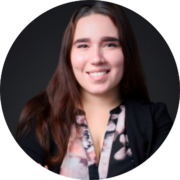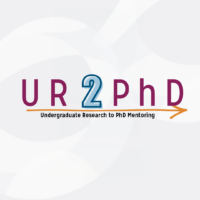NSF CSGrad4US Fellows – Get to Know Eden Shaveet
By Elora Daniels, Communications Associate
The NSF CSGrad4US Graduate Fellowship and Mentoring Program supports computing professionals who want to return to school to pursue a PhD.
The program begins with a structured mentoring and application support phase, helping participants navigate the often-daunting graduate school application process — especially for those who have spent time outside of academia. Once accepted into a PhD program, fellows receive additional support throughout their first year to aid in retention and success. After completing this initial year, they officially become NSF CSGrad4US Fellows, gaining access to a network of peers and unique opportunities to strengthen their computing research connections.
 One such fellow is Eden Shaveet, a PhD student at Cornell University specializing in multimodal information extraction and interpretation methods for health inferencing. Before starting her PhD, Eden held a short-term research position at Columbia University. As that position neared its conclusion, she reflected on her next steps and ultimately decided to return to academia to pursue “a career where I could shape my own research agenda, build my own lab, and mentor students.”
One such fellow is Eden Shaveet, a PhD student at Cornell University specializing in multimodal information extraction and interpretation methods for health inferencing. Before starting her PhD, Eden held a short-term research position at Columbia University. As that position neared its conclusion, she reflected on her next steps and ultimately decided to return to academia to pursue “a career where I could shape my own research agenda, build my own lab, and mentor students.”
We spoke with Eden to learn more about her experience as an NSF CSGrad4US mentee and fellow.
What has been the most rewarding part of being an NSF CSGrad4US Fellow?
The most rewarding part of the NSF CSGrad4US Fellowship has been the opportunity to connect with other fellows at a similar academic stage who are doing fascinating work. As contemporaries, we may enter the academic workforce around the same time, potentially establishing labs and faculty positions in parallel. Building these relationships across computing subdisciplines is invaluable, and the fellowship provides a platform to foster these connections early on.
Through your mentoring experience, did you have any ‘lightbulb moments’ of insight about your career or earning a PhD?
I had the wonderful privilege of being mentored by Dr. Katie Siek at Indiana University Bloomington, whose insights not only helped me refine my applications and statements but also clarified my purpose for pursuing a career in academia. She embodied much of what I aspired to be when I graduated.
Are there any unique opportunities you’ve experienced thanks to being part of the NSF CSGrad4US Fellowship program?
As a mentee, I was fortunate to receive one-on-one mentoring with a senior faculty member throughout my application cycle. As a fellow, I’ve had the opportunity to engage with an online community of other fellows, providing a vital space for exchanging ideas and seeking advice. This network has been instrumental throughout my matriculation and first year so far.
As part of the fellowship, I’m thrilled to be attending the CRA-WP Grad Cohort Workshop for Inclusion, Diversity, Equity, Accessibility, and Leadership Skills (IDEALS) this year and to explore additional research communities through a reimbursed technical conference of my choice. This is an opportunity I’m excited to take advantage of as I seek out the research communities I want to be a part of.
How do you hope to improve the field of computing beyond your time as an NSF CSGrad4US Fellow?
My research focuses on passive condition detection using digital signals that people naturally generate online. My overarching goal is to harness novel, passively collected data to uncover health-related insights, enabling early detection of conditions and timely interventions in a way that is both efficient and scalable. Seamlessly integrating health condition detection into ubiquitous computing in ways that make it effortless and unobtrusive has the potential to transform public and personal health monitoring as we know it.
What would you say to someone thinking about going back to school for a PhD in computing?
If you don’t fit the mold of a typical PhD student but have a drive to push the boundaries of human knowledge, you’ll find a home in our community. While the conventional academic path often belittles nontraditional journeys, many of us see them as a unique strength that brings fresh perspectives and insights. So, come on in! The water’s fine.
Is there anything else you’d like to share about your experience as an NSF CSGrad4US Fellow?
I’m immensely grateful to the Computing Research Association (CRA) and the National Science Foundation (NSF) for their investment in me and my research. This fellowship has given me the invaluable opportunity to focus fully on my work early in my PhD journey, without the immediate need for RA or TA responsibilities. It has truly allowed me to hit the ground running.
Ready to Start Your PhD Journey?
Established in 2023, NSF CSGrad4US has already helped over 125 industry professionals return to school to pursue their PhDs. Applications for the 2025 cohort are now open!








